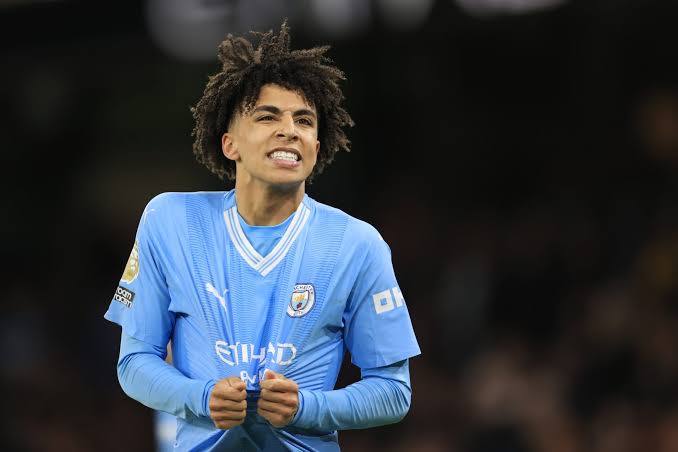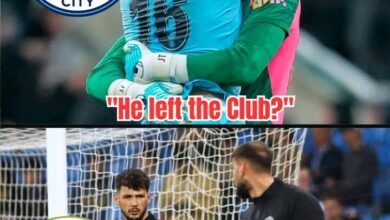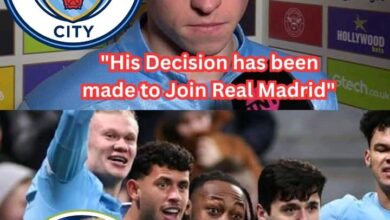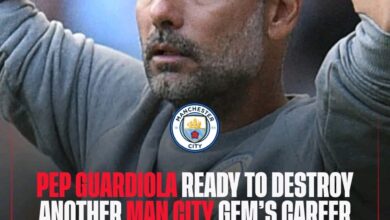Rico Lewis Contract Extension: Manchester City’s Future Investment Sparks Fan Debate

Manchester City’s academy graduate Rico Lewis has emerged as one of the most promising young talents in English football, representing both the present and future aspirations of the Sky Blues. At just 20 years old, the versatile defender-midfielder has already established himself as a trusted squad player under Pep Guardiola’s tutelage, demonstrating the kind of football intelligence and adaptability that has become synonymous with City’s modern success story.
Rico Lewis embodies everything that Manchester City’s academy system strives to produce: technically gifted, tactically intelligent, and mentally robust enough to thrive under the intense pressure that comes with playing for one of England’s most successful clubs. Coming through the ranks at the Etihad Stadium, Lewis has navigated the challenging transition from youth football to senior level with remarkable composure, earning the trust and admiration of one of football’s most demanding coaches.
Pep Guardiola’s faith in the young Englishman speaks volumes about Lewis’s potential and character. In a squad filled with world-class internationals and seasoned veterans, the fact that a 20-year-old academy product has carved out a significant role demonstrates both his exceptional ability and the manager’s confidence in his development trajectory. This trust has manifested in Guardiola deploying Lewis across multiple positions, utilizing his versatility as both a right-back and in various midfield roles.
The positional flexibility that Lewis offers has become increasingly valuable in Guardiola’s tactical system, where players are expected to be comfortable in multiple roles and contribute to the team’s collective understanding of space and movement. His ability to seamlessly transition between defensive and midfield duties reflects the modern game’s evolution toward multi-functional players who can adapt to different phases of play within a single match.
The news that Manchester City are prepared to offer Rico Lewis a new contract extension, treating it as a major priority, reflects the club’s long-term strategic thinking. This approach aligns with City’s established philosophy of securing their most promising talents early, ensuring stability while protecting their investment in player development. The timing of this contract discussion suggests that the club’s hierarchy views Lewis as an integral part of their future plans rather than merely a useful squad option.
From a business perspective, extending Lewis’s contract makes considerable sense for Manchester City. Academy graduates represent tremendous value, both in terms of their development cost compared to transfer market alternatives and their potential resale value should circumstances change. Moreover, homegrown players provide crucial squad registration benefits under Premier League and UEFA regulations, making their retention strategically important beyond pure footballing considerations.
The contract extension also demonstrates Manchester City’s commitment to maintaining a pipeline between their academy and first team, sending a clear message to other young players within their system that hard work and talent will be rewarded with opportunities and long-term security. This philosophy has been central to the club’s identity under the current ownership structure, balancing high-profile signings with investment in youth development.
The reaction from Manchester City supporters to Lewis’s potential contract extension reveals the complex emotions and expectations that surround young players at elite clubs. The fanbase appears genuinely divided, with passionate arguments on both sides reflecting deeper concerns about the club’s direction and squad composition.
Supporters who favor the contract extension point to Lewis’s intelligence as a footballer and his improved performances when surrounded by a functioning team structure. These fans recognize that his technical ability and understanding of Guardiola’s system make him a valuable asset, even if his long-term position within the squad remains somewhat undefined. They appreciate his development potential and view the contract as an investment in the club’s future.
The perspective that Lewis performs better “in a good and functional team” highlights an important consideration about young players’ development. Football is inherently a collective sport, and individual performances are often influenced by the overall team dynamic and tactical coherence. When Manchester City have functioned at their optimal level, Lewis has typically looked more assured and effective, suggesting that his development is closely tied to the team’s broader success.
One particularly astute fan observation suggests that Lewis’s future lies not as a full-back but as a central midfielder, specifically in the number eight role. This positional evolution would align with modern football trends, where many of the game’s most effective midfielders possess the defensive awareness and positional discipline that comes from playing in deeper roles earlier in their careers.
The discussion around Lewis’s contract extension connects to broader questions about Manchester City’s squad evolution and generational transition. Some supporters view his retention as part of a necessary clearing-out process, where established players like Ilkay Gündogan and Mateo Kovačić might make way for younger alternatives. This perspective suggests that keeping Lewis represents a commitment to refreshing the squad with hungry, developing players rather than relying solely on veteran experience.
The argument that sporting director Hugo Viana might “properly clear house” reflects fan anxiety about the squad’s aging profile in certain positions. If this assessment proves accurate, Lewis’s contract extension could be viewed as the first step in a broader rejuvenation strategy, creating opportunities for emerging talents while maintaining competitive standards.
However, this optimistic view contrasts sharply with concerns about Lewis’s specific role within the team structure. Critics argue that Manchester City’s reported interest in signing a new right-back undermines the logic of extending Lewis’s contract if he’s expected to compete for that position. Similarly, the midfield appears well-stocked with established internationals, raising questions about where regular playing time would come from.
The debate about Lewis’s optimal position reflects broader trends in contemporary football, where positional purity has given way to fluid, multi-role systems. Guardiola’s Manchester City exemplifies this approach, with players regularly shifting between positions both within games and across different matches. Lewis’s ability to operate effectively at right-back and in midfield positions makes him particularly valuable in this context.
Modern full-backs are increasingly expected to contribute significantly to their team’s attacking play, often operating more like wing-backs or even auxiliary midfielders during sustained periods of possession. Lewis’s comfort in midfield positions suggests he possesses the technical and tactical attributes to excel in these hybrid roles, potentially making him more valuable than a traditional full-back who struggles to adapt to these demands.
The evolution toward more fluid positional systems also means that players like Lewis can provide tactical solutions to specific match situations. His ability to drop into midfield from right-back, or conversely to provide width from a central starting position, gives Guardiola additional options when adapting his team’s shape during games.
Beyond the purely footballing arguments, Lewis’s contract situation involves important economic and regulatory factors that influence Manchester City’s decision-making. The Premier League’s homegrown player requirements create additional value for academy graduates, making their retention strategically important for squad registration purposes.
From a financial perspective, extending Lewis’s contract protects Manchester City’s investment in his development while potentially creating significant future value. Young players who establish themselves at elite clubs often command substantial transfer fees if they eventually move elsewhere, meaning that contract extensions can be viewed as asset protection strategies.
The regulatory landscape around player development and transfers also favors clubs that can successfully integrate academy graduates into their first-team squads. UEFA’s Financial Fair Play regulations and similar domestic frameworks often provide favorable treatment for homegrown talent, creating additional incentives for clubs to prioritize players like Lewis.
Perhaps the most provocative criticism leveled by Manchester City fans concerns the perceived decline in squad quality compared to previous seasons. The comparison between player transitions—”Mahrez to Savinho, Walker to Rico, De Bruyne to Kovačić, Laporte to Akanji”—suggests anxiety about whether the club is maintaining the extraordinarily high standards that characterized their recent period of dominance.
This concern reflects the challenging reality that elite clubs face when attempting to replace legendary players. The individuals mentioned in these comparisons—Riyad Mahrez, Kyle Walker, Kevin De Bruyne, and Aymeric Laporte—represent some of the finest players of their generation, making direct replacements virtually impossible to find in the transfer market.
However, this perspective may underestimate the natural evolution of successful teams. Football history suggests that sustainable success often comes from clubs that can successfully blend experience with emerging talent, rather than attempting to maintain the same personnel indefinitely. Lewis’s development should perhaps be viewed within this context, as part of a gradual transition rather than a direct replacement scenario.
Looking ahead, Rico Lewis’s career trajectory will likely depend on several interconnected factors: his continued physical and technical development, Manchester City’s tactical evolution under Guardiola and beyond, and the competitive landscape within the squad across multiple positions.
The next two to three years represent a crucial period for Lewis’s development. At 20, he has already achieved more than most players his age, but the transition from promising prospect to established performer requires sustained excellence and continued learning. His willingness to embrace different roles and responsibilities suggests a mature approach to his professional development.
The international dimension adds another layer to Lewis’s career progression. His inclusion in England squads demonstrates that his performances at club level are being recognized at the highest level, potentially creating additional motivation and providing valuable experience outside the Manchester City environment.
Guardiola’s tactical systems have evolved considerably during his tenure at Manchester City, and Lewis’s versatility positions him well to adapt to future changes. The manager’s preference for players who can operate in multiple roles suggests that Lewis’s skill set aligns well with the club’s tactical philosophy, regardless of specific formation adjustments.
The increasing emphasis on build-up play from defensive positions favors technically gifted players like Lewis, who can contribute to ball progression and chance creation from deeper areas of the pitch. His comfort with the ball and understanding of spacing make him well-suited to the demands of modern possession-based football.
As football continues to evolve tactically, the premium placed on intelligent, adaptable players is likely to increase. Lewis’s combination of technical ability, tactical awareness, and positional flexibility suggests he possesses many of the attributes that will remain valuable regardless of specific tactical trends.
The debate surrounding Rico Lewis’s contract extension encapsulates many of the complex considerations that modern football clubs must navigate when making strategic decisions about squad composition and development. The passionate responses from Manchester City supporters reflect genuine investment in the club’s future and legitimate concerns about maintaining competitive standards.
Ultimately, the decision to extend Lewis’s contract will be judged based on his continued development and contribution to Manchester City’s success over the coming seasons. The club’s track record in player development and strategic planning suggests that their assessment of Lewis’s potential carries significant weight, even if not all supporters currently share this optimism.
The broader implications extend beyond Lewis as an individual, touching on questions about squad transition, tactical evolution, and the balance between experience and youth in elite football. These considerations will likely become increasingly important as Manchester City navigate the post-Guardiola era and work to maintain their position among European football’s elite institutions.
Whether Lewis ultimately justifies the faith placed in him remains to be seen, but his journey thus far suggests a player with the character and ability to rise to whatever challenges await. The contract extension, should it materialize, represents both an opportunity and a responsibility—for the player to continue developing and for the club to provide the environment necessary for that development to flourish.















